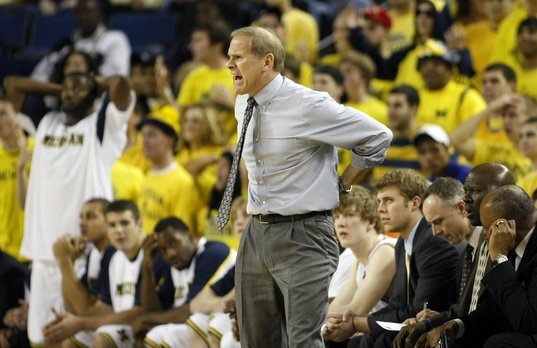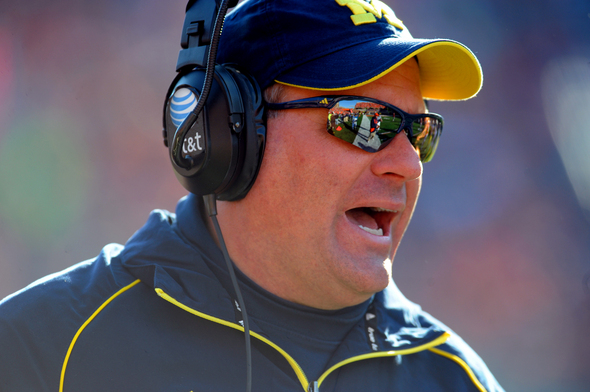 |
| Bed goes up |
 |
| Bed goes down |
Both men were considered "system coaches". Rodriguez is hailed as one of the innovators of the spread option offense, while Beilein's offensive and defensive systems were unusual; the former being of his own devising (like Rodriguez) and the latter being the 1-3-1 zone, rarely used in major college ball. I immediately dismissed Beilein's hiring as the "safe" play for the blue bloods at Michigan whom were determined to never allow the shadow of NCAA regulations to ever darken Michigan's southern campus again, even if that meant being a middle-of-the-pack program that only occasionally would compete for a Big 10 title, to say nothing of a national one. I was convinced that Beilein's system would not attract the players that we needed to get back to the upper strata of the basketball world, which seemed far more important to me, since basketball teams are fewer in number and far more reliant on on pure talent than football often is. Beilein was known as a "well-respected" coach among his peers, which is tantamount to referring to African-American men as "well-spoken". It means he's non-offensive. Everyone likes him, but doesn't think he's any kind of threat on the court and had been that way for many, many years. He had done well at the non-basketball power of West Virginia, but he certainly wasn't considered the same caliber of coach as a Rick Pitino.
Rodriguez, on the other hand, was one of the game's up-and-comers. He had taken West Virginia to heights that it hadn't realized since the early 90s under famed coach, Don Nehlen, and he was the mastermind behind the new wave of football offense, designed to gain a numbers advantage against the defense from almost any formation or position. It had been adopted or extrapolated upon by any number of prominent coaches in the game, including names like Urban Meyer. Anyone who had seen Michigan's play under Lloyd Carr for many of his last years had to be thrilled at the idea that opposing defenses would no longer be able to predict our plays. And I was thrilled. I grew up with Rick Leach and will always carry a torch for option football, even though my appreciation extends to any offensive system that works. Carr's, too often, demonstrably didn't. I thought our problems were solved and we were about to have one of the most exciting programs in the country. Finally, Michigan would be more than simply living off of its past glories. Well, it was exciting, in the literal definition of the word (synonyms: perturbation, agitation.)
At first, they both ran into trouble. Beilein's 10-22 first season was the worst result in the history of Michigan basketball. Not only did we not have the players we needed to compete in Division 1, but it was evident that converting said players to Beilein's approach to basketball was an enormous project. Furthermore, all of the talent on the team had been recruited by his predecessor, Tommy Amaker. Beilein's late arrival meant that he had to attempt to catch up in recruiting and could only land what were, to most basketball fans, non-entities in the recruiting world like Zack Novak, Stu Douglass, and Ben Cronin. In the next couple years, that pattern didn't change much, as Michigan State continued to sweep up most of the highly-regarded recruits in-state and we saw even more continue out of state to Tobacco Road and Louisville (coached by Rick Pitino...) However, his second season was a breakthrough: Michigan made the tournament for the first time in 11 years. I frequently cited my distaste for Beilein's system, which seemed heavily dependent on sharpshooting from the 3-point line and still believed that we couldn't compete on a level basis with MSU and OSU while that dependency existed, but I was willing to acknowledge his achievement.
However, the following season was a prominent setback. The team finished 15-17 and it was obvious to anyone that the offense wasn't functioning consistently and the 1-3-1 was not going to be effective without very specific personnel. After losing to OSU in the conference tournament, where we left their best player, Evan Turner, undefended as he sunk an admittedly phenomenal shot to end our season, I remember declaring that "We will never win a championship with Beilein as the coach."
RichRod also started poorly, going 3-9 and breaking Michigan's streak of non-losing seasons since 1967, as well as its NCAA-best-ever mark of 31 consecutive years in bowl games. It was blatantly evident that Michigan's transition to the spread was not going to be easy. Rodriguez had come into the job saying that he would design the offense around the personnel available, which seemed to imply that we would be running something at least partially conventional (what most refer to as a "pro set") while he taught the team how to work the spread. No such half-measures were taken. Not only was he attempting to institute the spread wholesale, but he was doing so with a severely depleted talent base, given Carr's lackadaisical recruiting over the previous couple of years However, he was lackadaisical himself about an entire facet of the game: defense. His coordinator, Scott Schafer, the only member of the staff without WVA roots, was instructed to install aspects of the defense that Rodriguez favored (the 3-3-5) and which Schafer was completely unfamiliar with.
Given the turbulent situation, Rodriguez's recruiting also frequently wasn't up to Michigan's historical standards. Beilein was looking for recruits that were hot shooters and often appeared to be little else. Rodriguez was looking for players that were almost solely suitable for the spread offense and, again, little else beyond that. Both were recruiting as if they were still in the disadvantaged position that they had at West Virginia or the stops that each had made before that (Canisius and Richmond for Beilein; Glenville State, Tulane, and Clemson for Rodriguez.) Both systems had been designed because their respective teams lacked the players that their opponents often had. When you form a habit, you tend to stick to it. That's what a habit is. If you've always recruited tiny receivers from the backwoods of Florida and done well with them, you'll tend to do it again. If you've always recruited Euro-style, shooting forwards who can't play inside, you'll tend to do it again (even if that style of ball won't play well in the B1G, where officials often let basketball games function as thinly-disguised rugby matches.)
I eviscerated Beilein for his failures because his style of basketball was something I didn't appreciate. I enjoy the precision of the Princeton-type approach, but am more eager to see an inside game that contests an opponent directly. Contrarily, I wanted to forgive Rodriguez for his failures because I loved his style of offense, even though it's essentially the same principle as the Princeton basketball offense. It wasn't "smashmouth football". It was "I'm going to score whether I have to smash you or not" football. After years of the grinding of Carr, I was more than eager for it. By the same token, after years of Amaker's "pass around the perimeter and then take a shot from outside when there's 3 seconds left on the clock" approach, Beilein's system seemed to be just a slightly more complex version of the same.
And here was the fork in the road.
Confronted with the fact that his recruiting and offensive approach wasn't going to put Michigan back atop the Big 10, Beilein dumped his whole staff and changed directions. He largely abandoned the 1-3-1 (people still assign it to him, even though Michigan has run it only a handful of times in the past 3 years) and changed his methods. All team members used to have to complete a ridiculous number of threes in pre-season practice and even centers were expected to shoot the 3 when given the opportunity. Now, players do what they're best at. I don't think Jordan Morgan has attempted a 3 in the past two seasons. Beilein's ability to find hidden gems like Pittsnogle has continued, as he correctly identified current stars Trey Burke, Tim Hardaway, Jr, Glenn Robinson III, and Nick Stauskas long before rivals did, but he's also begun to win the battles for hotly-contested stars like Mitch McGary. Michigan still uses the three and still employs misdirection and backdoor cuts, but it also runs a more conventional offense with ball screens, iso plays, and a transition offense better than any seen since the Fab 5.
RichRod, on the other hand, confronted with some of the same facts as Beilein, and the fact that his defense was a nightmare, did almost nothing to alter his approach. He still recruited like he was at West Virginia, hired another defensive coach sight unseen, and still did nothing to ease the transition from the offense that Michigan had employed since 1982. The defense was, in the end, the most damning issue (including Mike Martin's assertion that the defense was used as a punching bag for the offense in practice) but it was evident that, in need of some drastic measures, Rodriguez was in over his head. And, again, I wanted Rodriguez to succeed. The system that he created is fast becoming an essential part of the stodgy NFL's offensive approach and will likely be used by the aforementioned Meyer to torture Michigan for the next decade (It remains to be seen whether Al Borges can adapt...) No one should have been expecting him to run a standard one-back passing attack anymore than they would expect Beilein to run Bo Ryan's abomination of an offense. But we could expect him to do what Beilein did and change just enough to adapt to the environs in which he found himself. That's the mark of a smart coach and a smart program director. Rodriguez did neither and, facing the drastically higher expectations for football at Michigan, found himself fired and engendering far less respect from me as a coach.
I'd still love to see the spread at Michigan. I think ignoring its possibilities will be a key flaw in Michigan's effort to compete with OSU for the Big 10 title. If Rodriguez gets canned at Arizona, I honestly wouldn't hesitate for a second to suggest that he'd make a great OC, especially with someone like Hoke around to ensure that the whole team gets coaching and advise that perhaps we don't quite have the quarterback to run the read option. But he's not a great head coach and I don't think I could safely suggest him as that to any fanbase looking for a replacement (if anyone bothered to ask me.) Beilein, on the other hand, is a great head coach. He's not perfect but he understands how to adapt and that's the best kind of leader, in my opinion, and he did so at an institution absolutely famous for not changing (and now under the control of an athletic director who thinks every Twitter post is an excuse to have a "Wow moment".) So, I was wrong about at least one of Bill Martin's multiple screw-ups as athletic director. He still screwed up, but it was with the other guy. That's not to say it wouldn't have been cool to see what Pitino could have done here...





No comments:
Post a Comment
Note: Only a member of this blog may post a comment.